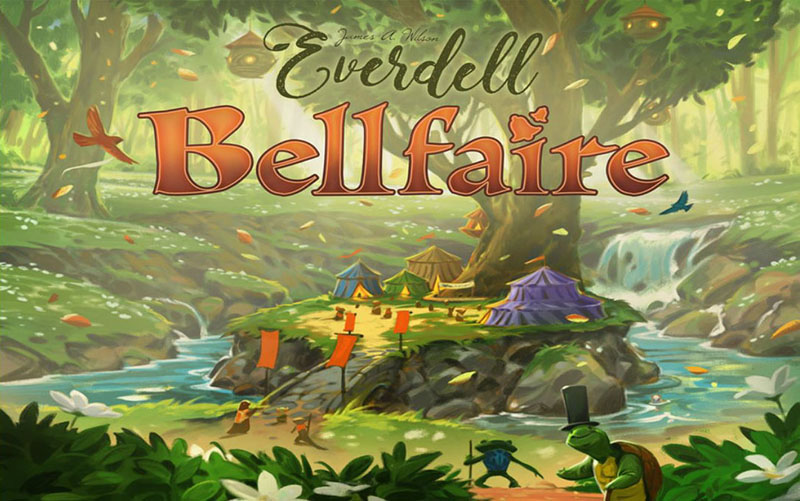
For the last 99 years, the critters of Everdell have been hard at work building cities in their beloved valley.
Now it is time to celebrate! The king and queen are throwing an unprecedented year-long event to commemorate the 100th year since Everdell's founding. Come one, come all! Come and celebrate the Bellfaire!
Bellfaire offers a number of different modules and components that you may include when playing Everdell, such as a flat board that can be used in place of the Ever Tree, new Special Events, endgame Garland Awards, unique player powers for each critter type, rules for 5-6 players, and more!
Components
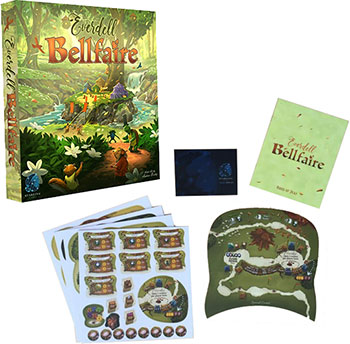
- 1 Bellfaire Board
- 1 Flower Festval Event Tile
- 7 Garland Award Tiles
- 9 Special Event Cards
- 1 Market Board
- 4 Forest Cards
- 15 Player power Cards
- 8 Axolotl/Any Tokens
- 1 Rugwort Token
- 6 Player Boards
- 4 Market Tokens
- 12 critters
- Instructions
Modules
Bellfaire offers a number of expansion options that may be used when playing the base game of Everdell or one of its expansions. Before setting up the game, players should choose which modules they wish to include. The details for each module, including setup and rules, are outlined below.
Player Boards
These boards may be used as an area to store resources, workers, and point tokens. Players may choose any board that they wish to use.
Forest Locations
You may shuffle these 4 new Forest locations into the deck of other Forest locations during setup.
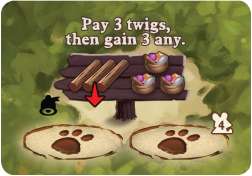
Note: You must pay the full 3 twigs to use this location.
Special Events
The new Bellfaire special Events are less specific events than those found in the base game. These can be added to the game in a number of ways, depending on preference:
- Shuffle them in with all of the other special Events during setup.
- Shuffle and draw 2 of these special Events and 2 of the other special Events.
- Use only these Bellfaire special Events.
Flower Festival Event
You may place the Flower Festival basic Event beside the main board, or on the designated space on the Bellfaire board. This basic Event is achieved the same way as the other basic Events.
To achieve this Event, you must have 1 of each of the 5 card colors in your city, and place a worker on the event to claim it.
Garland Awards
These represent special awards granted by the king and queen to cities that display excellence in specific aspects of their city.
During setup, shuffle the Garland Awards and draw 1, placing it either faceup beside the main board or in the designated area on the Bellfaire board.
At the end of the game, the player who has the most cards in their city of the type listed on the Garland will gain an additional 6 points. Second place will gain an additional 3 points.
If players are tied for either first or second, they will both gain the listed point bonus.
Your city must contain at least 1 of the listed card types to be eligible for the reward.
Market
You may place the Market board beside the main board, or use the Market area on the Bellfaire board.
At the beginning of the game, place the 4 Market tokens on the "gain" side of the Market.
When placing a worker here, you must choose to either gain resouces, or trade them.
If gaining, choose one of the available tokens, gain the resources and cards, then move that token to the "trade" side.
To trade, pay the resources and discard the amount of cards listed on any token on the "trade" side, then gain 3 point tokens and 2 of any resources from the supply, then move the token back to the "gain" side.
You may only have up to 1 of your workers deployed to the Market at a time.
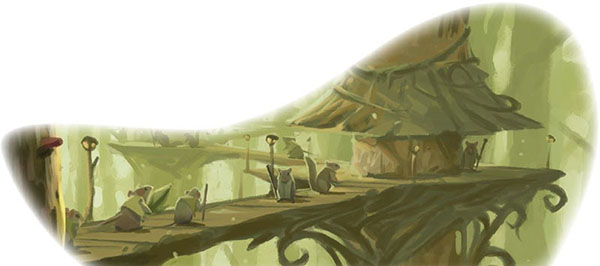
Bellfaire Board
Instead of using the 3D Ever Tree, you may use the Bellfaire board. Place your workers along the top of the board in the Season locations. Place the special Events along the bottom of the board. You may place the deck on the stump of the Ever Tree, or off to the side of the board to help with visibility.
The Bellfaire board contains the Market location, and spaces for the Flower Festival Event and Garland Award tiles.
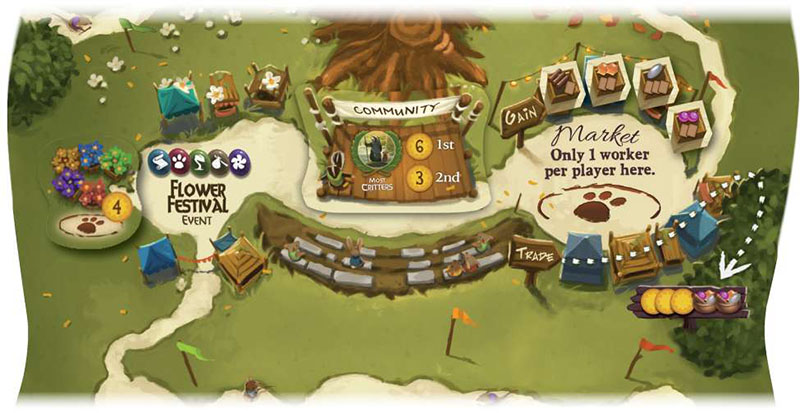
Bellfaire board set up to play with the Flower Festival, Garland Awards, and Market modules.
5-6 Players
When playing with 5 or 6 players, apply these changes:
-
Do not gain a worker when you Prepare for spring.
-
Play with 5 special Events with 5 players, and 6 special Events with 6 players.
-
Players have a hand limit of 7 cards instead of 8.
-
Deal this number of starting cards: 1st player: 5 cards 2nd player: 5 cards 3rd player: 6 cards 4th player: 6 cards 5th player: 7 cards 6th player: 7 cards
-
After you have passed at the end of the game, discard any cards in your hand.
-
If you run out of cards in the draw pile, shuffle the discard pile to replace it. If you run out of all cards in the draw pile and discard pile, you may draw from the Meadow cards as if they were the draw pile.
If you run out of cards in the Meadow, no more cards may be drawn for the remainder of the game, unless cards are discarded, creating a new draw pile.
Player Powers
Using Player Powers will give each player a unique ability, based on which critter type they choose.
All powers are additions to the normal rules of the game, so they do not replace the normal functions of workers that are allowed in the game, and they are not considered "card- playing abilities".
Before game setup, each player should be dealt 2 player powers and choose 1 to use, returning the others back to the box.
When using Player Powers, do not gain a worker when you Prepare for spring.
If playing with Player Powers in a solo game, it is recommended that you also include one or more of the solo variants listed at the end of this rulebook.
Each Player Power is outlined in detail in the next section.
-

Axolotls: At the beginning of the game, place 1 of the "any" resource tokens on each of the Basic locations on the board
(the locations along the edge of the river). When you visit a Basic location, also gain the "any" resource token from there. You may use each token one time as any resource of your choice.
-
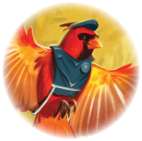
Cardinals: Increase your hand limit by 2 cards. After you draw cards, either from placing a worker or another effect, you may draw 1 additonal card.
-

Foxes: When you place a worker on a Forest location, instead of activating that Forest location, you may instead activate any non-permanent location where an opponent has a worker deployed.
This may include locations on Destination cards like an Inn or Queen, but not a Cemetery since it is a permanent location.
-
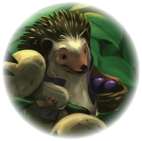
Hedgehogs: If you did not gain a berry when you placed a worker on a Basic or Forest location, gain 1 berry.
When playing a Construction, you may pay 2 berries to replace 1 of any resource in the cost.
You may pay as many berries as you would like. Example: You could pay 6 berries to decrease the cost of a Construction by 3 resources.
-

Lizards: Begin the game with the unused Forest locations in a shuffled facedown deck.
At the beginning of each season, including the beginning of the game, draw 3 and choose 1 to play in your area, placing the other 2 at the bottom of the deck.
You alone may visit these Forest locations. Note: An opponent may not copy these Forest locations with a Lookout.
-
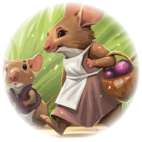
Mice: After you visit a Basic or Forest location, you may gain 1 of any resource that you do not already have.
-
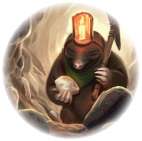
Moles: Whenever you use a worker to gain resources from a location, you may pay up to 1 of those resources you just gained to gain 1 pebble.
-

Otters: When playing a Construction, you may use resin as any resource.
-

Owls: Increase your hand limit by 1 card. After you place a worker, you may discard 1 card from your hand and/or draw 1 card.
You may keep this drawn card, or you may give it to an opponent. If you give it away, draw 2 cards.
-

Platypuses: Begin the game with five 1-point tokens on your Player Power card.
At any time on your turn, you may pay up to 1 of these tokens to gain 1 of any resource and draw 1 card from the deck or the Meadow. Any tokens you do not use are worth points at the end of the game.
-
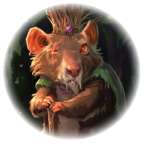
Rats: At the beginning of the game, place the Rugwort token on any Meadow card.
Whenever that card is played, either by you or an opponent, gain 1 of any resource that you do not already have, then move the Rugwort token to a different Meadow card.
You only gain the reward and move the token if the card is played, not if it is drawn or discarded.
-

Squirrels: Any time you use a worker to gain at least 1 twig, gain 1 additional twig. When playing a Construction, you may pay 2 twigs to replace 1 of any resource from the cost.
You may pay as many twigs as you would like. Example: You could pay 6 twigs to decrease the cost of a Construction by 3 resources.
-

Starlings: Increase your hand limit by 3 cards. When you draw cards, you may choose to draw from the deck or the Meadow.
You may draw from a combination of both. Do not replenish the Meadow until you finish drawing all cards. If you are required to "reveal" cards, such as with a Postal Pigeon, they must be from the deck.
-

Toads: Whenever you play a Production card, you may discard 1 card and then activate the Production card twice.
You may only do this 1 time for each Production card (you may not use this ability to activate a Production card 3 times). You must discard the card before you activate the Production card.
-

Turtles: After you play a card and resolve its effects, you may place 1 of any resource on your Player Power card from your supply, or, if there is already a resource there, gain back that resource plus 1 more of the same type you just gained from the supply.
Any resources left on the card at the end of the game count as part of your supply for scoring purposes. Example: You play a card, and earlier you placed a pebble on your Player Power card. Now gain back that pebble plus 1 more pebble from the supply.
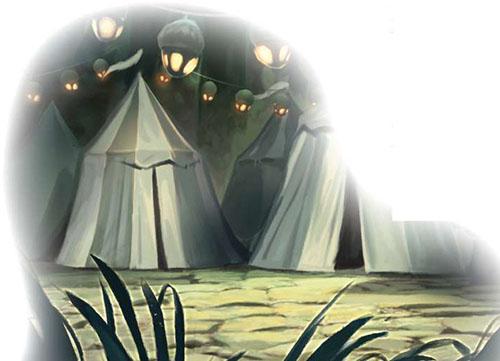
Solo Game Notes
You may not use the Rats Player Power in a solo game. If Rugwort claims the Flower Festival event, he scores 4 points for that Event. Rugwort still gets all of his workers, even if you are using Player Powers and you do not a gain a worker in spring.
For a more challenging solo game, try adding 1 or more of these variants:
Glitzy: Every Prosperity card Rugwort plays is worth 5 points instead of 3.
Squatty: Rugwort scores 2 points for every space in your city where you have not played a card.
Hasty: During Rugwort's Prepare for Season action, he will immediately achieve the leftmost special Event.
Lucky: If you roll the same number that was previously rolled, give Rugwort 1 point token.
Cranky: If you roll an 8, you must randomly discard 1 card from your hand.
Continue Reading


